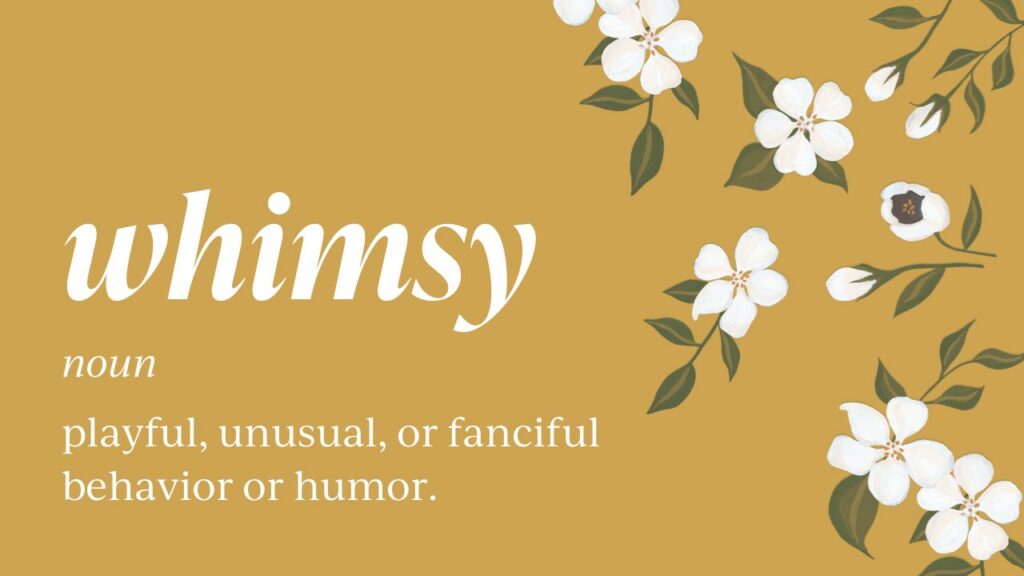
With spacious days and alert nights, I slowly carved whimsy out of my anxiety. It had been trapped within the grip of endless to-dos for some time.
Whimsy wants us to imagine stories, play with forms, see and read fun things, fill our minds with new possibilities, let go of control, embrace uncertainty, and find humor in whatever comes.
Whimsy cannot be checked off a list or fit into a schedule.
It flourishes with ample solitude and no plans.
It isn’t serious or practical or purposeful.
It loses its way in the digital and virtual.
It can change our brains, our patterns, and our lives.
And it definitely cannot be monetized.
What a shame that it can take a crisis for us to dust off our original fanciful natures. Or perhaps this is one of life’s greatest gifts—that when we’re in darkness, we can still dig deep to find our inner delight. How much less motivation we have to do this when normalcy returns after the urgency passes.
So, while you’re making room for everyone and everything else today, leave a little space for your your whimsy. Write a poem that no one will read, doodle in the margins, sing and dance in the kitchen, meander slowly around the block. Take a breath.
Sometimes this is all we need to rediscover our playful, peaceful selves.
xo,
Sarah
Still need to upgrade Google Analytics?
We had a fun and cozy water cooler call earlier this year to upgrade to GA4. A few lovely clients got to meet and talked everything from the future of Google Analytics to ChatGPT. If you haven’t yet upgraded, take a look at the DIY instructions here. Let me know if you want a video or to do this together live.
Know someone with insomnia?
If you know someone struggling with severe insomnia, I wholeheartedly recommend (without affiliation) The Sleep Coach School, as well as the books and videos by MD-turned-sleep coach Daniel Erichsen. Daniel’s teachings are simple, ingenious, and life-changing (for insomnia and beyond). Even though up to 50% of Americans experience sleep disorders and up to 15% are estimated to have chronic insomnia, it can be difficult to find information that truly helps. I have come to believe that all of the other popular medical and psychological information I encountered about sleep, insomnia, and even anxiety are misguided. In the hopes that it will help someone, I’ve shared about my weird and wild journey through insomnia here and here. If you have any questions, let me know—I find this topic endlessly interesting.

2 Responses
Hi Sarah! I’m so happy you are open to questions! Reading your Medium article at 4am this morning brought me much hope. I have a couple questions:
1) During your recovery, did you find you thought about sleep constantly? It’s on my mind every waking moment. I know it’s just my brains way of saying “hey, pay attention to this problem!”. Did you find it faded naturally as the struggle with sleep faded or did you do any special practice to redirect thoughts? (One Immunity school member said she used MCT to redirect)
2) Did you actively stop yourself from googling/researching sleep related topics? Or talk about them? I know Daniel’s “Set it and Forget It” teaches us to let go of giving insomnia our time and attention. (Sasha Stevens and Beth Kendall also have a similar teaching) I find it’s hard after a night of 0 sleep to not google a success story. I’m wondering if this keeps fueling the fire!
Thanks so much. ❤️
Hi Mary: I’m so sorry for my delay. I just now saw your comment on my website with insomnia questions. I do hope you are well on your way to the other side of insomnia. If not, I hope I can provide some helpful answers to your questions.
1) You asked if I thought about sleep constantly during recovery, and the answer is a big huge YES. When I was in the insomnia struggle, it was all I thought about for sure. It took me a while to change those thought patterns as I unwound the fear. The practice that helped me the most was simply recognizing the thoughts and being gentle with myself. Like I got in the habit of saying, “Oh, there it is, another fearful looping thought. Silly brain, you’re ok, you’re safe, etc.” At night, if a fearful looping thought popped up, I would follow the ACT practice of imagining that thought as a character or object and inviting it to hang out. I found that not trying to redirect or fight my thoughts and instead accept them was the best approach for me.
2) When I was in the middle of my muddle, I also did a ton of Googling and researching. But once I was in the immunity program, I did try to limit my time spent in insomnialand– but that time was probably still about 2 hours a day until I was more on my road to recovery. I believe that being easy on myself was a big part of recovery, so I’d recommend not being too strict and trusting that you’ll get less interested as you go along. But if it’s taking time away from work and life and doesn’t feel healthy (like it eventually did for me), a limit might help.
I hope this is helpful, and I hope even more that you are in a place now where you don’t need this help. Let me know how things are going and I apologize again for my delayed response.
Best to you,
Sarah